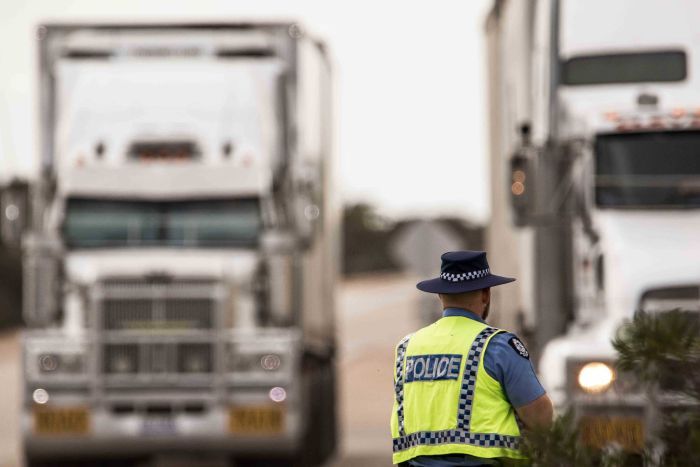Coronavirus border control measures expected to disrupt illegal drug distribution


Photo:(ABC Goldfields-Esperance: Jarrod Lucas)
Researchers suggest the distribution of illicit drugs in Western Australia could be disrupted by tough new border restrictions put in place to slow the spread of COVID-19.
- With borders closed in WA, researchers think it may cut down on illicit drug distribution from air, road, and sea
- Australian Border Force says it will work as hard as ever to crack down on illicit drug movement
- One rehabilitation centre says it can't take any more residents because of the risk of COVID-19 infections
This week the State Government moved to bolster WA's borders, restricting non-essential travel between the state's nine different regions and closed all interstate borders last night.
Steve Allsop, Professor at the National Drug Research Institute at Curtin University, said while these kinds of measures were unprecedented, history told us the current pandemic would undoubtedly affect the distribution of illegal substances in Australia.
"Certainly when you've got fewer people travelling, when you've got increased security at airports, when you've got much more limited shipping and airline transport, that's clearly going to have an impact on supply," he said.

'Suppliers running slim'
Peter Lyndon-James used to sell two and half kilograms of methamphetamine a day.
After being in and out of prison for most of his life, Mr Lyndon-James has now been substance-free for 20 years.
He is the founder and CEO of a drug rehabilitation service in Western Australia.
Shalom House currently has 105 residents at its facilities.
Mr Lyndon-James said the border closures have had an effect on the distribution of methamphetamines in regional WA.
"The phone hasn't stopped ringing … with people wanting to seek rehabilitation," Mr Lyndon-James said.
"But from what I have heard, people … the suppliers, whoever has it, are running slim.
"So in one sense it's a good thing in tackling addiction … but if you're really serious about getting [methamphetamine] you get it."
Mr Lyndon-James said the drug rehab service was unable to take on any more residents because of the risk of new residents having COVID-19.

Learning from history
Dr Allsop said there were a number of historic examples of illicit drug distribution being disrupted in WA.
"During the Gulf War there was increased security for example around airports," he said.
"We saw a reduction in the supply of heroin — particularly in Western Australia, which is so far away from the eastern states."
But when the supply of imported heroin decreased in the state, there was a rise in domestic production.
"Some people sought to meet demand by producing what was called 'home-baker' — a locally made synthetic product from pharmaceutical products made into a sort of alternative to heroin," Dr Allsop said.
Similarly, illicit drug distribution behaviours changed in Northern Ireland during the Troubles.
"Your car was going to be checked for contraband and weapons … so you were less than inclined to transport illicit substances," he said.

Drug supply only 'temporary' disruption
Dr Allsop said the disruption of transport routes in regional Western Australia would likely only be temporary.
The Australian Criminal Intelligence Commission (ACIC) said between August 2018 and August 2019 Australians spent $11.3 billion on methamphetamine, cocaine, MDMA, and heroin.
"Because the rewards are financially so high in this, people try to find ways around it," Dr Allsop said.
Methamphetamine or 'ice' being sold in Western Australia reaches the state's vast shore by air or by sea, as well as being produced domestically in clandestine laboratories.

Teen Challenge Grace Academy is a drug rehabilitation centre in Esperance, 700 kilometres south-east of Perth.
Executive director Malcolm Smith said he was hopeful the flow of illicit drugs to the regional community would be disrupted.
"This border control will certainly stop these people, but they are very resourceful I'm afraid to say, these people who do the delivery of drugs," he said.
"But hopefully, we look on the bright side, that maybe it will restrict it, we want it to restrict the delivery of drugs to regions."
A spokeswoman from the Australian Border Force (ABF) said it was business as usual for the organisation.
"ABF officers work tirelessly at our airports, mail centres and ports 24 hours a day, 365 days a year," she said.
"The work carried out by the ABF has not stopped as a result of COVID-19.
"It is business as usual when it comes to detecting illicit substances and stopping illegal imports."
Drug use could spike during COVID-19 crisis
Data from an ACIC National Wastewater Drug Monitoring Program revealed Western Australia had some of the highest methylamphetamine consumption in the country during the 2019 testing period.
The report said, after New South Wales, WA had the highest average capital city consumption of meth.

Dr Allsop said while there are no precedents in place for the current pandemic, it was possible there could be an increase in drug use during the current health pandemic.
"People may be having their routine disrupted, being at home, some being more stressed than they normally will be," he said.
"We might see that being an incentive for people to drink more or for people to use other substances more either to fill the time or indeed to self-medicate."
Dr Allsop said it would be important for State and Federal Governments to address the pandemic and the associated risks.
"We will need to attend to mental health issues, relationship problems, possibly an increase in domestic violence, and certainly accompanying that for at least some in the community problems relating to alcohol or other drug use," he said.
For Teen Challenge Grace Academy, Mr Smith said they were playing it day by day.
"Just watching our students who are improving," he said.
"Sometimes a crisis brings the best out in people and it's certainly improving our people at GA."
 Pathways Drug Rehabilitation Luxury Addiction Treatment & Detox Center
Pathways Drug Rehabilitation Luxury Addiction Treatment & Detox Center


